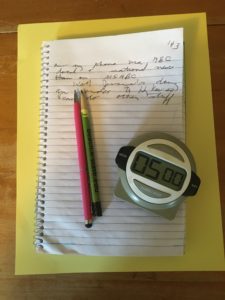 A Writing Warmup
A Writing Warmup
Long ago in the ‘70’s in graduate school at the Ohio State University, I learned a warm-up writing technique that I used on the first day of every college writing class, no matter what kind, for the next thirty-five years of my writing career. Indeed, I used it in the sample class I taught my future colleagues who later told me cinched the deal since it was a leading edge, process-oriented writing method.
So what is it? It’s called sprint or speed writing, and it’s perfect for quieting that ump or inner critic that might be plaguing you.
Here’s how to do it.
1. Get something to write on and something to write with. Pencil and paper are fine or you can do it on your laptop.
2. Also get a timer. The kitchen timer works fine or you can set the timer on your phone. Set it for a short amount of time, 5 minutes minimum, 10 minutes tops.
3. You need something to write about. My personal classroom favorite – indeed the one that got me the college teaching job I had for twenty-five years: Something that really makes you mad.
4. Here’s the basic rule for the exercise: Once you start writing, don’t stop. Don’t worry about spelling or correct usage. If you can’t think of a name, leave a blank. If you get stuck, repeat the word you’re stuck on until you think of something else to put on the page. Especially do not worry if you go off on a tangent from the topic you started with because you might discover what you really want to write about.
5. Here’s the topic for this exercise: Something that makes you really mad.
6. Ready. Set. Go.
7. When the time is up, finish the thought you’re working on, put your pencil down or lift your hands from the keyboard. You might want to massage your hands as you think about what you just wrote, especially any surprises you noticed about what you wrote or how long it took to produce the number of lines you did.
Congratulations. You’ve just practiced sprint writing. I use this method a lot and for all sorts of writing including fiction and creative nonfiction.
